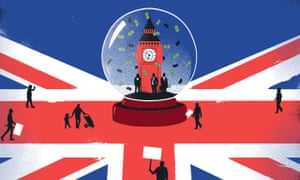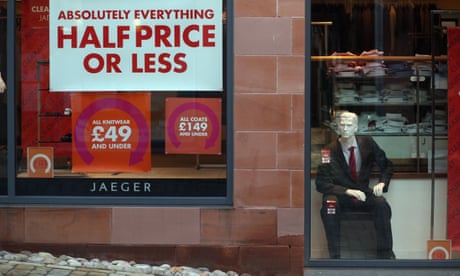
Illustration: Sébastien Thibault
Just after midnight on 25 May 2016, a senior staffer in the remain campaign sent colleagues an urgent message. “Voters are very sceptical about our warnings on the economy,” began his email. “They don’t trust the numbers. They don’t trust the Treasury.” As head of strategy for Britain Stronger in Europe, Ryan Coetzee had bombarded Britons with evidence of the economic damage they would do to themselves if they didn’t stay in the EU. He and his team enlisted the Bank of England, the IMF, the OECD and pretty much every acronym that mattered. They’d wagged fingers, flung numbers around and pointed out the danger signs.
Just after midnight on 25 May 2016, a senior staffer in the remain campaign sent colleagues an urgent message. “Voters are very sceptical about our warnings on the economy,” began his email. “They don’t trust the numbers. They don’t trust the Treasury.” As head of strategy for Britain Stronger in Europe, Ryan Coetzee had bombarded Britons with evidence of the economic damage they would do to themselves if they didn’t stay in the EU. He and his team enlisted the Bank of England, the IMF, the OECD and pretty much every acronym that mattered. They’d wagged fingers, flung numbers around and pointed out the danger signs.

From David Cameron down, leading remainers considered the economy their trump card. In the biggest single choice Britain had had to make for four decades, they were sure economics would be the deciding factor. But with less than a month to go before the vote, seasoned operative Coetzee could see the strategy was failing. Why, just a few days earlier, George Osborne had produced Treasury analysis that Brexit would send house prices plunging by as much as 18% – and BBC journalists reported being deluged with calls from would-be buyers asking where they could sign up.
As remain started losing its central argument so, internal polling analysis showed, it began trailing leave. Hence the panic in that late-night memo, quoted by Tim Shipman in his history of the referendum, All Out War. One of Shipman’s Labour sources in the campaign cut close to the bone: “When we started just saying, ‘the economy will be fucked’, it showed what a profound misunderstanding they had of Labour motives. Across the north-east and the north-west people already felt like the economy was fucked and not working for them.”
Bingo. Project Fear stuck as a catchphrase precisely because Osborne’s rhapsodies over the health of the economy sounded to so many like Project Fantasy.
Osborne banged on about Britain’s miracle recovery even while pay remained below pre-crash levels. His replacement at No 11, Philip Hammond, made a big flourish in his last budget of doling out “little extras” to schools where teachers now face huge funding shortfalls. Over the past few years Westminster has embarked on a march of the makers that looked more like a punch-drunk stagger, erected a northern powerhouse almost invisible to the naked eye, and declared a war on skivers and freeloaders – led by Iain Duncan Smith, the cabinet minister who claimed £39 in expenses for one solitary breakfast.
But this economic chasm runs deeper and longer than just the past decade. Around the same time that Coetzee was raising the alarm in Westminster, I was reporting in Pontypool, south Wales. It was market day, and locals reminisced about old times, when the town centre would be “rammed”. In that day’s drizzle it was half-deserted. In the 80s and 90s, voters in south Wales were assured that vibrant new industries would replace the coalmines and steelworks that had shut down. What actually filled the void was public spending, and casual work and self-employment that barely paid its way.
“It’s dead now, because they took what they wanted,” Neil told me, his glasses specked with paint from his day job as a decorator. “They” meant Westminster, London, the rich. “Thatcher smashed the unions. Boosh! We’re out of here. Boosh! They’ve moved on.” Raised in a Labour family in a blood-red part of the country that had been deceived by the political classes for so long, he now considered all politicians “liars”. And in the EU referendum, he intended to let them know.
In the crudest of ways, Neil and others got some of what they wanted. Since the summer of 2016, politicians and pundits will freely declare that something in British politics and economics is broken. The trouble is, the governing classes are no closer to knowing what exactly is bust, let alone how to fix it.
It ultimately comes down to this: decades of privatisation, hammering unions and chucking billions at the housing market while stripping the welfare state has effectively ended any semblance of a national, redistributive economy in which a child born in Sunderland can expect to have similar life chances to one born in Surrey. Yet politicians remain fixated on mechanisms that no longer work adequately for those who actually depend on the economy. They obsess over GDP growth when the benefits of that are unequally shared between classes and regions. They boast about job creation when wages are still on the floor.
Most of all, they brag about London, the one undoubted gleaming success of the British economic model. “A pound spent in Croydon is of far more value to the country than a pound spent in Strathclyde,” to quote Boris Johnson, the Conservative party’s last surviving greyback. But that is to ignore how London itself is rapidly becoming unlivable for many Londoners. New research by academics the Foundational Economy Collective shows that Londoners are the least likely in the country to have a mortgage and the most likely to swim in the shark-infested waters of the private rental sector. This is great for landlords and for employers, who enjoy a conveyor belt of ready-made renters and workers supplied to them from the rest of Britain and Europe. It is not such a great bargain for the rest of us. The high income generated by London is matched by the massive income inequality suffered by Londoners.
The irony is that Neil and other Labour leave voters have handed the keys to the very people least interested in reversing any of this. The top economic brains among the Brexiteers, miserable throwbacks such as Patrick Minford and John Redwood, believe the problem with Thatcher’s revolution is that it didn’t go far enough.
We rarely ask people what they want from the economy; if we did it more often, the answers might surprise us. The free-marketeers at the Legatum Institute did pose the question in a survey conducted in 2017. Top priorities for respondents were: food and water; emergency services; universal healthcare; a good house; a decent well-paying job; and compulsory and free education. At the bottom were owning a car and cheap air travel. HS2, a new runway at Heathrow or a garden bridge on the Thames didn’t even rank.
After reporting the survey, the Legatum Institute concluded: “Significant portions of the country … are vehemently anti-capitalist.” The report was co-authored by Matthew Elliott, former head of the Vote Leave campaign. Which just about sums up the Brexiteers’ politics: savvy enough to listen to what people want, cynical enough never to enact it.
No comments:
Post a Comment